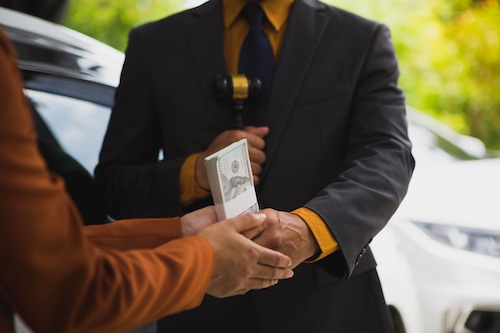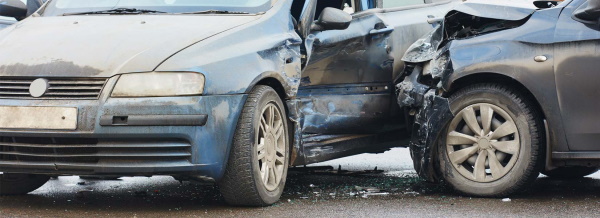- Car Accidents
Leslie has over 3 decades of civil litigation and trial experience for personal injury and family law. She is a member of the State Bar of Georgia litigation and family law sections.
Insurance Adjuster: What You Say Can Change Your Claim
At Wade Law Office, we fight for people harmed in car accidents, truck wrecks, slips and falls, and other injury cases in Georgia. Jonathan Wade and our team combine decades of trial experience with personal attention to every client. We work hard to gather evidence, negotiate with insurance companies, and take cases to court when needed. You do not pay us unless we win. We will stand with you, guide you, and aim to get the full compensation you deserve.
After a car accident, one of the first people to contact you will likely be an insurance adjuster. Their questions may sound routine, but every answer you give can influence your final settlement. The adjuster’s job is to protect the insurance company’s interests, not yours. A single phrase or casual remark can reduce the value of your claim or shift blame away from the other driver.
Understanding what to say—and what not to say—helps you protect your rights and strengthen your position. If you have any doubts, an Atlanta car accident attorney can guide you through every conversation and handle negotiations on your behalf.
Who Is the Insurance Adjuster & Why Their Questions Matter
Insurance adjusters handle the investigation and settlement of auto claims for insurance companies. Their questions shape how your claim is reviewed and how much compensation you may receive. Understanding their role helps you avoid mistakes that could harm your case.
The Role of the Insurance Adjuster
An insurance adjuster, sometimes called a claims adjuster, investigates accidents, reviews evidence, and determines payment amounts. They collect police reports, witness statements, and medical documentation. Their main responsibility is to protect the insurance company’s financial interests while resolving the claim. Adjusters work under an insurance license issued by the Georgia Department of Insurance and must follow state regulations found in O.C.G.A. §33-23-43.
Who Employs the Adjuster
Most adjusters are employees of the insurance company. Others work as independent contractors or public adjusters who handle property or life insurance claims. Each adjuster type has different duties and authority levels. For example, a company adjuster manages auto claims for their employer, while a public adjuster may represent individuals in disputes involving property damage or settlement reviews.
Why Their Questions Are Strategic
An adjuster’s questions are rarely casual. They are designed to gather information that helps the company determine liability, verify injuries, and limit the final settlement. They may ask about your job, medical treatment, or how the accident happened. Simple answers such as “I’m fine” or “I may have been at fault” can reduce your payment or shift blame.
Georgia’s Oversight of Adjuster Conduct
In Georgia, adjusters must maintain continuing education credits to keep their licensure active. They are required to perform their duties ethically and fairly under O.C.G.A. §33-6-34, which prohibits unfair claim settlement practices. These rules aim to ensure that claimants receive honest communication and accurate claim evaluation.
Why You Should Be Cautious
Every statement you make to an insurance adjuster can affect your claim. The adjuster’s goal is not to represent you but to close the case efficiently and minimize the payout. Before answering detailed questions or signing documents, consult an Atlanta car accident attorney who can protect your rights, review communication, and manage settlement negotiations on your behalf.
What Not to Say (and Why)
What you say to an insurance adjuster after a car accident can shape the outcome of your claim. The wrong words can damage your credibility, reduce your compensation, or even shift fault. Knowing what to avoid helps protect your case and strengthens your position during settlement discussions.
“I’m Fine” or “I Feel Okay”
Avoid saying you are fine when speaking to a claims adjuster. This statement can be used to argue that your injuries are minor or unrelated to the accident. Many injuries, such as soft tissue damage or concussions, appear days later. Instead, say that you are still being evaluated by a doctor and will provide medical records when available.
Admitting Fault or Apologizing
Never admit fault or say you are sorry after an accident. Statements like “It was my fault” or “I didn’t see the other car” can harm your claim. Georgia follows a modified comparative negligence rule under O.C.G.A. §51-12-33, which can reduce compensation if you share responsibility. Let the investigation and your Atlanta car accident lawyer determine liability using police reports and evidence.
Guessing or Speculating
Do not guess or speculate about what happened. Saying “I think” or “Maybe he was speeding” creates inconsistencies that an insurance company can exploit. Stick to facts such as location, time, and vehicle positions. If you are unsure about something, say “I do not know” or “I cannot recall.”
Discussing Prior Injuries or Medical History
An adjuster may ask about your health or past injuries. Avoid volunteering details about unrelated conditions. Insurance companies often use prior injuries to dispute new claims. Your attorney can release only the records relevant to the accident. Keep answers brief and limited to current treatment and recovery.
Agreeing to a Recorded Statement
Insurance companies often request recorded statements early in the process. You are not required by Georgia law to provide one. Recorded statements can be edited or taken out of context. Politely tell the adjuster you will provide written responses or speak through your attorney once you have reviewed all documentation.
Accepting the First Settlement Offer
The first settlement offer is usually lower than what your claim is worth. Do not agree to any payment before you understand the full extent of your injuries, property damage, and future expenses. Ask for time to review the offer and consult your Atlanta car accident attorney before signing any agreement.
Sharing Personal or Financial Information
Limit what you share about your income, job duties, or personal life. Adjusters may use this information to argue that your injuries did not affect your ability to work or that your losses are minimal. Only provide documentation that directly supports your claim, such as medical bills or repair estimates.
Using Casual or Emotional Language
Avoid emotional or casual remarks like “It’s no big deal” or “I just want this over with.” Such comments can make it easier for the insurance company to close your claim quickly with a lower payout. Stay calm, factual, and professional throughout all communication.
Threatening or Arguing with the Adjuster
Confrontation rarely helps your case. Threats or angry responses can cause delays or hostility from the insurance company. Keep every conversation respectful and concise. If you feel pressured, end the call and contact your attorney for guidance.
Keeping Your Guard Up
Insurance adjusters are trained to collect information that helps their employer, not you. Everything you say is documented and reviewed. Before you speak, think about how your words may be interpreted. When in doubt, let an Atlanta car accident lawyer handle communication to protect your claim and maximize your final settlement.
Strategic Communication: What You Should Do/Ask
Speaking to an insurance adjuster requires focus and control. Clear communication helps you protect your claim, maintain credibility, and avoid statements that reduce your compensation.
Stay Calm and Professional
Remain polite and steady when dealing with a claims adjuster. Avoid emotional or defensive behavior. Adjusters are trained to evaluate tone and reactions. A calm voice helps you appear credible and cooperative. Keep each conversation short and on topic.
Keep Written Records
Document every interaction with the insurance company. Write down the adjuster’s name, title, phone number, and the date of each call. Note the questions asked and your responses. Keep copies of all letters, emails, and text messages. Written records help verify what was said and protect you if disputes arise.
Provide Facts, Not Opinions
Stick to clear, factual statements. Only discuss details that you personally observed or verified, such as time, location, and vehicle damage. Avoid giving opinions about fault, speed, or injuries. If you do not know an answer, say so directly. This keeps your report consistent and prevents misunderstandings.
Ask Direct and Useful Questions
You can ask questions that clarify your claim status. Examples include:
- “Do you have authority to settle this claim?”
- “What coverage limits apply under my policy?”
- “Which parts of my claim are being reviewed or denied?”
- “When can I expect a written response or payment?”
These questions keep the conversation focused and show that you understand the process. They also ensure you receive written confirmation of key details.
Limit What You Share
Only provide information that is necessary for the review of your claim. Do not discuss your medical history, income, or personal life unless it directly relates to your injuries or damages. Let your Atlanta car accident lawyer handle sensitive documentation, such as medical records or employment verification.
Follow Up in Writing
After each conversation, send a short summary email confirming what was discussed. Written follow-up reduces confusion and prevents changes to your statements. If the adjuster makes an offer or request, ask for it in writing before agreeing.
Know When to Stop Talking
If the adjuster begins pressing for more details or requests a recorded statement, pause the conversation. Tell them you prefer to continue through your attorney. Once you have legal representation, all communications should go through your Atlanta car accident attorney. This step prevents errors and protects your right to a fair settlement.
Protect Your Claim Through Control
Your ability to stay organized and disciplined can affect the outcome of your claim. Control each interaction, stay factual, and avoid giving personal opinions. If you feel unsure, stop the conversation and seek legal guidance before continuing.
Talk to an Atlanta Car Accident Attorney at Wade Law!
If you have been in a car accident, do not face the insurance adjuster alone. Every statement you make can affect the value of your claim. Our team at Wade Law understands how insurance companies work and how to protect your rights under Georgia law. Let us handle the communication, gather the evidence, and fight for the settlement you deserve.
Contact us at 770-282-1188 for a free case consultation today!












